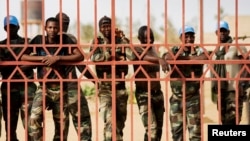Mali's Prime Minister Modibo Keita urged a swift agreement in negotiations with rebels restarting this week in Algiers, saying progress was "looking very good" toward a definitive peace deal in the north.
Attempts to reach an accord between Mali's government and the mostly Tuareg rebel movements demanding more autonomy in the country's north have been complicated by security on the ground and clashes with United Nations peacekeepers.
Tuareg separatist rebels, known as the MNLA, threatened last month to pull out of peace talks and suspended coordination with the U.N. mission in Mali after seven of its fighters were killed in an attack by U.N. forces.
"Time is no longer our friend, it's our enemy," Keita said after meeting Algerian President Abdelaziz Bouteflika late on Tuesday, according to APS state news agency. "The more we drag this on, the more complicated security becomes in the north."
Mali's vast desert north has risen up four times in the last five decades, with various groups fighting for independence or a form of self-rule from the government in the south.
Late last year, the two sides agreed in Algiers a roadmap for negotiations that called for several rounds of talks before a final peace deal is signed in Mali. No date was set for that agreement.
"We are no longer so far from a deal, this why we are pushing hard to get all the conditions right," said one Algerian source close to the negotiations. "The Malian prime minister being here is a good signal."
Three main rebel groups — the Tuareg MNLA, High Council for the Unity of Azawad (HCUA) and the Arab Movement of Azawad (MAA) — have sought to unify their positions. Azawad is the Tuareg name for their desert homeland in northern Mali.
But distrust between the Malian army and rebels and divisions among the Tuareg and Arab groups also make a broader settlement on the ground more complicated even if a peace deal is reached, analysts say.
Both sides regularly charge the other with breaking ceasefire agreements on the ground.
Northern Tuareg and Arab rebel groups have long accused governments in the south of neglect. While Mali's government rules out Northern independence or full autonomy, it is open to devolving more authority over local affairs.





